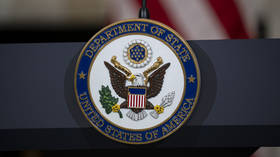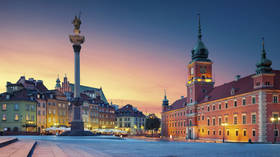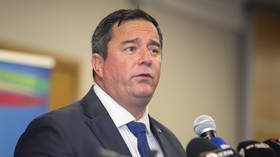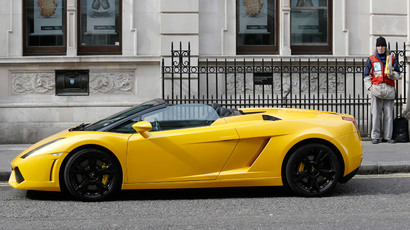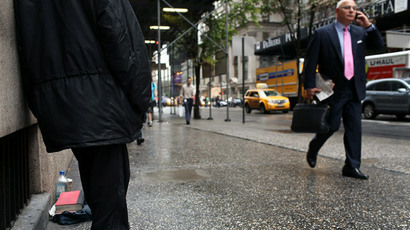Mind the gap: UK the only G7 state to see a rise in wealth inequality – report
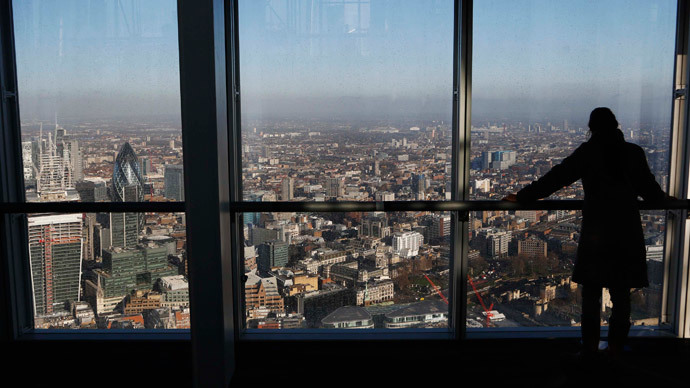
Britain is the only G7 country where inequality has grown since the start of the 21st century, according to a report by Credit Suisse published on Tuesday. It showed the UK’s richest 10 percent have become wealthier since the financial crisis.
The annual global wealth report shows the number of the rich and super-rich in Britain rose sharply. While there were only eight billionaires at the start of the century, the UK now hosts 44. The number of people whose net worth is at least $50m (£31m) has almost quadrupled to 4,660.
By contrast, all other G7 member states (US, Japan, France, Germany, Canada and Italy) have seen wealth inequality either remain the same or fall since 2000. In the UK, however, with the richest 10 percent in control of 54.1 percent of Britain’s total wealth, the gap continues to widen.
Recently, the anti-poverty charity Oxfam found Britain’s five richest families are worth more than the country’s poorest 20 percent.
Oxfam’s head of inequality, Emma Seery, said: “These figures give more evidence that inequality is extreme and growing, and that economic recovery following the financial crisis has been skewed in favor of the wealthiest.”
Seery claimed that successive British governments have failed to “get to grips” with rising inequality.
“Those least able to afford it have paid the price of the financial crisis whilst more wealth has flooded into the coffers of the very richest,” she said.
READ MORE:Richest 1% own 50 percent of world wealth- Credit Suisse report
The report shows that wealth inequality is continuing to grow. The richest 1 percent now own 48.2 percent of the world’s wealth, up from 46 percent last year. Meanwhile the bottom half of the global population own less than 1 percent of the total wealth.
Anthony Shorrocks, who helped draft the report, told the Guardian that London was a factor in Britain’s rising inequality, because of its rising property prices and its position as Britain’s financial center.
“[Britain’s rising inequality] could well reflect the regional divide between the South East and the rest of the country,” he said.
While the rich are getting richer in Britain, low and middle-income households are struggling due to below inflation wage increases and spiraling rent and utility bills.

READ MORE:Inequality gap between super rich and poor continues to widen
The report comes as the Campaign to End Child Poverty published a map defining which regions of the UK suffered the highest levels of child poverty.
Inner-city London scored badly, with 10 out of the top 20 areas suffering the highest child poverty rates, while Glasgow scored as Scotland’s worst-affected area.
In London, Bethnal Green and Bow had a child poverty rate of 49 percent, compared to affluent Richmond upon Thames, which scored a 15 percent rate.
The estimates were compiled for the Campaign to End Child Poverty by the Centre for Research in Social Policy at Loughborough University.
Neil Mathers, spokesman for End Child Poverty, said: “These figures reveal just how widely and deeply child poverty reaches into our communities.
“Politicians of all parties, at Westminster and Holyrood, need to act to tackle the root causes of poverty, including low pay and soaring housing and childcare costs.”
Disputing the findings, a government spokesman told the BBC: “The figures do not provide an accurate picture of child poverty. We’re doing more than ever to help children, the attainment gap for deprived pupils has fallen and we've just seen the largest fall in unemployment since 1988.”
Britain's unemployment rate fell to 6.0 percent between June and August this year, the lowest level since the three months to October 2008, the ONS revealed on Wednesday.
While the economy and profits are showing signs of recovery, a majority of Britons are not yet feeling the benefits.
In a recent YouGov poll, 41 percent of Brits said they were not feeling any benefits from the economic recovery and did not expect to. Just 16 percent said they were already benefiting from an economic recovery when asked in mid-October.




